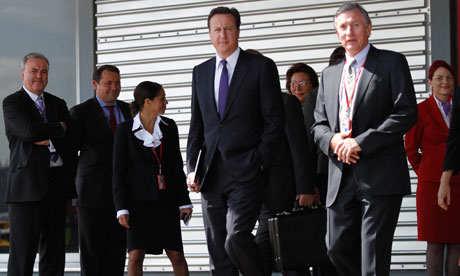Fresh fears of a sovereign debt crisis gripped financial markets yesterday with investors taking flight from risky assets, providing a tense backdrop for world leaders as they convened for this weekend's crunch summit on the global economy. As the leaders made their way to a lakeside resort near Toronto, Greece again came under particular scrutiny as the cost of protecting its government debt against default soared to a record high. Sterling strengthened against the euro in a reflection of continued investor confidence in George Osborne's tough budget. On his aircraft to the G8 and G20 summit, David Cameron sought to play down reports of a rift in the G20 between those seeking immediate deficit reduction and the United States, which fears an over-hasty withdrawal of stimulus packages could derail global recovery. The prime minister said: "This weekend isn't about a row over fiscal policy. We all agree about the need for fiscal consolidation. For me this G20 is about putting the world economy on an irreversible path to recovery." Today the Bank of England uses its bi-annual financial stability report to highlight the financial markets' increasing focus on the "strains placed on sovereign balance sheets". More recently, says the report, there has been a retreat from risk-taking and renewed strain in bank funding as worries mount about sovereign debt. Referring to support from the International Monetary Fund and European authorities, the Bank said: "While these measures helped to stabilise conditions, market pressures have not yet abated." The Bank concluded that UK banks' resilience had been boosted thanks to raising their capital and liquidity buffers "substantially", which had helped them weather recent tensions. "But, in common with their peers, they face a number of challenges in the period ahead," it added. "UK banks need to maintain resilience in a difficult environment, while refinancing substantial sums of funding." The report warns that the push by authorities worldwide for regulations on capital and liquidity requirements will take time rather than happen overnight. Cameron expressed concern about the lack of credit getting through to companies but said the government expected loose monetary policy to keep the economy growing. He said: "We want monetary policy to do the work. We want to make sure money is getting out of the banks to businesses". The leaders of the G20 countries will also discuss ways to reform banks in a bid to avoid another financial crisis like the one that plunged much of the world into recession. The first meetings, between the G8 group of leading industrial nations, will see Germany's chancellor Angela Merkel and US president Barack Obama go head-to-head over austerity measures. The US is worried that removing stimuli from the economy and pushing through tax rises and spending cuts too soon could upset an already fragile recovery. But Merkel spent the run-up to the crunch summit airing her views on why Germany and other European countries were right to embark on austerity measures. "Germany has done much more to revive the global economy than most other nations," she told national broadcaster ARD. She used an interview with the Wall Street Journal to directly counter Obama's calls for Germany and other big exporters to rebalance global demand by focusing on boosting their domestic consumer spending. She said: "Artificially reducing Germany's competitiveness would be of no use to anyone." With market players still jittery about the chances of Greece and other southern European countries keeping up their debt repayments, German government bonds, or bunds, were in high demand yesterday. The flight to quality in the market saw bunds rally, Greek bond prices fall and share prices also dive, with the FTSE 100 suffering its biggest daily fall in three weeks, down 1.5%. The euro succumbed to fresh fears about problems spreading within the currency union and against the pound. The single European currency fell to an 18-month low of 81.80p. In a stinging attack on policymakers yesterday, Albert Edwards, strategist at Société Générale, said: "The clowns pulling the levers of fiscal and monetary policy will take us back into recession." Edwards predicted that both economic and market recovery would "collapse like a pack of cards" as stimuli were withdrawn.G20 leaders flying into a storm as sovereign debt fears grow again

Saturday, 26 June 2010
• Cost of insuring Greek debt soars
• Cameron seeks to play down rift with US
Posted by
Britannia Radio
at
07:40
![]()





















